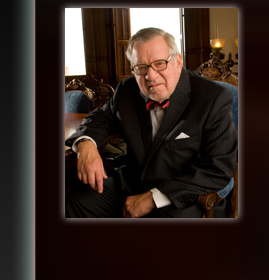Bill Hobby has devoted his life to public service to his country, his state, and his city--as a naval officer, journalist, parliamentary expert, governmental policymaker, university agent, Lieutenant Governor of Texas, university professor, and Chancellor of the University of Houston System.
Born January 19, 1932 in Houston, Bill Hobby graduated from Rice University in 1953. After graduation, he served four years in the United States Navy. During his Navy days, he married Diana Poteat Stallings of North Carolina. They have four children and nine grandchildren.
Subsequent to his military service, he joined the staff of The Houston Post, the flagship of his family's communications business. He was President of The Houston Post for nearly 21 years when the family sold the paper in 1983. He currently serves as Chairman of the Board of Hobby Communications.
Bill Hobby received his first major exposure to the governmental process at age 27, as Senate Parliamentarian of the 56th Texas Legislature under the guidance of Lieutenant Governor Ben Ramsey.
He headed an extensive review of the state's welfare system before his election as Lieutenant Governor in 1972.
After the Texas Constitution was changed to lengthen the term of office from two to four years, Bill Hobby won re-election in 1974, 1978, 1982, and 1986, serving longer than any Lieutenant Governor in Texas history.
From 1995 to 1997 he was Chancellor of the University of Houston System. Currently, he is the Radoslav Tsanoff Professor at Rice University.
He serves as a director for The Lyndon Baines Johnson Foundation and the Center for Public Policy Priorities, and is a past director for Southwest Airlines.
In 2010, his book How Things Really Work: Lessons from a Life in Politics (with co-author Saralee Tiede) was published by the Dolph Briscoe Center for American History.
Bill Hobby's and his family's era in Texas politics and public service brought tremendous progress in numerous areas--public education, mental health, water conservation, fiscal management, indigent health care, corrections, and public assistance programs, to name a few.
But none of his many achievements is more important than his determination that Texas must sustain its commitment to excellence in higher education, and his support for the resources that make that possible.

